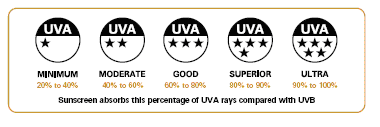The sunscreen industry is thriving on consumer demand in recent years, fuelled by the increasing skin cancer rates. However how many of the claims made by the sunscreen industry are true and do you really know what you think you know? Let us examine these notions further:
Myth #1: Sunscreens protect us from skin cancer
 Strange as this may sound, sunscreens may not really protect us from skin cancer. Major public health authorities worldwide including the FDA, International Agency for Research on Cancer and National Cancer Institute say that sunscreens alone do not reduce skin cancer rates. In fact some studies have actually shown that people who use sunscreens are more prone to skin cancer!
Strange as this may sound, sunscreens may not really protect us from skin cancer. Major public health authorities worldwide including the FDA, International Agency for Research on Cancer and National Cancer Institute say that sunscreens alone do not reduce skin cancer rates. In fact some studies have actually shown that people who use sunscreens are more prone to skin cancer!
There is no doubt that sunscreen’s are designed to protect us from the harmful Ultraviolet (UV) rays (in sunlight, tanning beds etc) that are scientifically proven to be responsible for skin cancer. So, How do we explain this paradox? There are several explanations to this:
1. Sunscreen SpF primarily relates to protection from UV-B light which is responsible for sunburn. It is UV-A light however that is actually responsible for skin cancer and most folk have no understanding of this. So just because you do not burn (from the protection offered by a high SpF sunscreen), it does not mean that you are not going to get skin cancer (from UV-A light)!
Please check your sunscreen label to make sure it covers for UV-A too. In the UK there is a star (0-5) grading system used for UV-A. However the star is only as good as the SpF. So for example if you have a SpF 15, 5* sunscreen and a SpF30 5* sunscreen, the UVA protection in the latter would be twice the former, even though both are 5*. So always opt for a high SpF and high * rating.

More Reading- Changing Moles: What you need to Know.
2. The biggest reason: Sunscreen users often stay out in the sun for longer than necessary on the false presumption that they are safe, in contrast to someone who is sensible and sitting in the shade. Thus, this leads to more sunburns and increased skin cancer risk. In fact what is worse is that parents are even falsely secure about their children! In a Swedish study, children aged 2 to 7 whose parents had applied sunscreen on them were more likely to experience sunburn than those who received little or no sunscreen!! Something to think about….
DO NOT use a sunscreen as a means to stay in the sun for longer!
Use a sunscreen with a minimum SpF of 30 (and UV star rating of 4/5*).
Apply it 15-20 mins before going out and once again before you go out.
Reapply the sunscreen every 2 hours and again after swimming.
Do NOT sunbathe.
Covering up with clothing and avoiding midday sun/direct sun exposure, are the only certain means of protecting yourself.
Myth #2: It is not hot- so I do not need a sunscreen!
Another common misconception…. Heat from sunlight is generated by infrared and UV-B light. As already discussed, skin cancer is related more to UV-A light, which is present in in the sun rays throughout the year irrespective of other UV wavelengths. So one needs to protect oneself from sunlight irrespective of the ambient temperature, in summer AND winter, WHETHER it is cloudy or clear!
More Reading- Skin cancer types and pictures
Myth #3: It is enough to use a sunscreen with an SpF of 8-15.
SpF reflects the amount of time one can expose oneself to sunlight with the sunscreen, as compared to without. So technically, if you usually burn within 10 minutes of sun exposure, a SpF 15 sunscreen should allow you to stay out for 150 mins without getting sun burnt (again, please note that this has no bearing on skin cancer protection). However, this is true only in test conditions when the sunscreen is applied as a thick layer. In practical terms, the protection afforded is just close to 4x. The official recommendation of the British association of Dermatologists is to use a sunscreen with a minimum SpF of 30.
Myth #4: The higher the SpF of a sunscreen, the better the protection.
In general, yes, this is true but only until a certain point. There is absolutely no evidence that using a sunscreen with an SpF >50, provides any more protection. That is why it is now illegal for sunscreen companies to advertise total sunblocks.
Myth #5: If I apply an ‘All day’ sunscreen, I can save money/ effort and need not reapply the sunscreen.

Unfortunately this is again a marketing gimmick and there is no sunscreen that provides protection for more than two hours.
Obviously, if you are worried about your moles or skin cancer, Consult a Dermatologist.
Any other questions?…do feel free to post as comments at the bottom of this page.
2 Comment
Write a Reply or Comment
You must be logged in to post a comment.


Should you keep your moles covered when you are #sunbathing, or is a #Sunscreen enough? #melanoma #skincancer |
Are you at risk of Skin Cancer? #RiskFactors #SkinCancer |